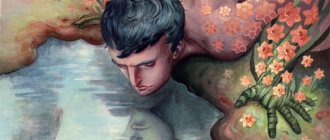Character traits
As already mentioned, distims are more focused on the negative. They manage to get upset and feel sad even when joyful events occur in their lives.
At the very least, they only notice what can upset them. Happiness passes by them as if in transit, without lingering in memories at all.
They are characterized by slow thinking and reactions to various stimuli. Before saying anything, they take a long pause, collecting their thoughts and thinking through every word. They do not actively participate in conversations; they mostly listen silently, occasionally inserting remarks and comments.
A child of the dysthymic type is easy to identify; he is usually unconfident, timid and fearful. He is rarely seen playing, which is accompanied by loud laughter.
Usually he concentrates on collecting construction sets and mosaics and refuses to participate in competitions and other group meetings.
He prefers loneliness, it’s calmer and safer for him, and it gives him the opportunity to reflect on some sad aspects of life, while no one distracts him with conversations.
E. Kraepelin (1915) called representatives of this type “haltlos”, i.e. unrestrained, unstable. K. Schneider (1923) emphasized their lack of will (“weak-willed”). Given the similarity of the names “labile” and “unstable” (instable), it should be noted that the first refers to the emotional sphere, and the second to behavior. It is in the formation of socially acceptable norms of behavior that the greatest deficiency of this type is revealed. Their lack of will is clearly manifested when it comes to study, work, fulfilling duties and obligations, achieving goals that are set for them by relatives, elders, and society. However, in the search for entertainment, representatives of this type also do not show great assertiveness, but rather go with the flow, joining the more active teenagers.
As children, they are distinguished by disobedience, often restlessness, getting into everything and everywhere, but at the same time they are cowardly, afraid of punishment, and easily obey other children. Elementary rules of behavior are difficult for them to assimilate. You have to watch them all the time. Some of them experience symptoms of neuropathy such as stuttering, nocturnal enuresis, etc.
From the first grades of school there is no desire to study. Only under constant and strict control, reluctantly obeying, do they complete tasks, but are always looking for an opportunity to shirk their studies.
At the same time, an increased craving for entertainment, pleasure, idleness, and idleness is detected early. They run away from classes to the cinema or just walk down the street, for days without doing anything, they hang around in places where teenagers usually gather. Instigated by more energetic peers, they may run away from home.
Everything bad seems to stick to them. The tendency to imitate in unstable adolescents is selective. Only those models of behavior that promise immediate pleasure, a change of light impressions, and entertainment serve as role models. They start smoking as children. They easily commit petty thefts and gravitate towards street companies. When they become teenagers, former entertainments like cinema no longer satisfy them. Stronger and more acute sensations are used - hooligan acts, alcohol and other intoxicating drugs.
Even E. Kraepelin (1915) mentioned the purposeless criminality of the unstable. The delinquency of these teenagers is, first of all, a desire to have fun, especially in companies.
Drinking starts early - sometimes from 12-14 years old and always in the company of antisocial teenagers. The search for unusual experiences easily leads to acquaintance with other intoxicating drugs. The unusual sensations and illusory experiences that arise during their action are shared with friends with the same rapture as they talked about detective films in childhood.
With the onset of puberty, such adolescents strive to free themselves from parental care. The reaction of emancipation among the unstable is closely linked with the same desires for pleasure and entertainment. They never have true love for their parents. The troubles and concerns of the family are treated with indifference and indifference. For them, relatives are only a source of means for pleasure.
Unable to occupy themselves, they tolerate loneliness very poorly and are early drawn to street teenage groups. Cowardice and lack of initiative do not allow them to take the position of leader here. They usually become obedient tools of these groups. In group offenses, they have to “pull chestnuts out of the fire,” and the leader and the more stenish members of the group reap the benefits.
Their hobbies are entirely limited to informational and communicative hobbies and gambling. They have an aversion to sports. Only a car and a motorcycle remain tempting for a long time as a source of almost hedonistic pleasure at breakneck speed with the steering wheel in your hands. But persistent studies push them away here too. But the theft of cars and motorcycles for the purpose of riding is a significant part of their delinquency. Amateur artistic performances do not attract them; even fashionable pop ensembles quickly become boring to them. All types of hobbies that require at least some labor are incomprehensible to them.
Sexual attraction is not strong. Among the unstable, there are frequent cases of psychophysical infantilism and delayed sexual maturation [Lebedinskaya K. S. et al., 1978]. However, early involvement in antisocial groups leads to sexual experience, including exposure to debauchery and perversion. Sexual life becomes the same source of entertainment for unstable teenagers as constant drinking and adventures.
Romantic love passes them by; it is simply incomprehensible to them how one can fall in love with someone; they are incapable of sincere love, as well as of devoted friendship. A company for entertainment is always preferable to a real friend for them.
Studying is easy to neglect. No work becomes attractive. They only work when absolutely necessary. Their indifference to their future is striking; they do not make plans, do not dream of any profession or any position for themselves. They live entirely in the present, wanting to extract maximum entertainment and pleasure from it. Difficulties, trials, any troubles, the threat of punishment - all this causes the same reaction - to run away.
Running away from home and boarding schools is a common act of unstable teenagers. During their escapes, they look for asocial company, a suitable companion, under whose influence they easily fall. The first escapes serve as a primitive way to avoid trouble or at least delay punishment (impunitive escapes). Repeated escapes are often caused by a search for entertainment, a desire to get rid of all work, and a craving for a “free life” (emancipation escapes).
Suicidal activity, according to our observations, is unusual for unstable adolescents. Only among those who are conformally unstable do affective suicide attempts occur.
There are a number of different points of view on the essence of the unstable type - instability of emotions, weakness of will, disturbance of drives, pathological mobility of nervous processes, inability to develop a stable life stereotype (review was given by A. I. Korotenko, 1971). Weakness is, apparently, one of the main traits of the unstable. It is weakness of will that allows them to be kept in a harsh and strictly regulated regime. When they are constantly being watched, they are not allowed to shirk work, when idleness threatens with severe punishment, and there is nowhere to escape and it is impossible to escape, and everyone is working around them, they resign themselves for a while. But as soon as control weakens, they immediately rush to the nearest “suitable company.”
The weak point of the unstable is neglect, an atmosphere of connivance, which opens up space for idleness and idleness.
The self-esteem of unstable adolescents is often distinguished by the fact that they attribute to themselves either conformist or hyperthymic traits.
Among male adolescents hospitalized in a psychiatric clinic, the unstable type was equally represented by both psychopathy and character accentuations (see Table 3).
As a rule, in cases of psychopathy, behavioral disorders begin in childhood.
Alexander B., 14 years old. The only son from a quite prosperous family. In childhood, mild stuttering was occasionally noted, and nocturnal enuresis was noted in the preschool years. Behavioral disorders began in the first grades of school. Despite his quite satisfactory abilities, he did not want to study. Fearing punishment for bad grades, unlearned lessons, and pranks, he ran away from home and skipped school. He went to the cinema, played on the street, stole treats and small money. At first he returned home at night. Then he began to spend the night in the front doors and basements.
From the age of 11-12, he began to often skip classes at school, but thanks to his good abilities, he still did not stay for the second year. At the age of 13, he began to run away from home “out of interest.” He spent the night in an unknown place, stole jackets from school wardrobes, and resold them. He hung around hotels, begging for small change from foreign tourists.
At the request of his parents, he was placed for examination in a children's psychiatric hospital. He revealed extreme frivolity, irresponsibility, cowardice, and deceit. I didn’t want to study or take part in labor. After being discharged, he completely dropped out of school, spent all his days in street groups of asocial teenagers, repeatedly did not come home to spend the night, tried to go to Moscow with someone, and was detained by the police.
In a teenage psychiatric clinic, he was drawn to antisocial teenagers, avoided work, and became mischievous. He avoided giving information about himself; when questioned, he was secretive and deceitful. He admitted that he once smoked “some kind of dope.” He drinks only sweet wine and in small quantities. Loves movies and all kinds of shows. He doesn’t make any plans for the future. He denies sexual contacts and avoids talking about this topic. When communicating with peers, he showed good knowledge of sexual issues, including some homosexual experience. He did not show any sexual activity in the clinic.
He avoided examination with the help of PDO.
Diagnosis. Psychopathy of an unstable type of severe degree.
Catamnesis. After being discharged, he ran away from home again, was caught stealing, convicted and sent to a colony.
Behavior similar to that described—“unstable behavior syndrome”—can be observed in different types of psychopathy and character accentuations. Traits of this type can be layered on the hyperthymic, hysterical conformal, epileptoid and even labile and schizoid nuclei [Alexandrov A. A., 1978] . The features of such psychopathies have already been described. The conformally unstable variant will be discussed below.
Unstable psychopathy may be constitutional. Such cases especially amaze others when teenagers grow up in good harmonious families, endowed with all the negative behavioral traits of unstable ones, as can be seen in the above example. However, more often this psychopathy is a consequence of psychopathic development based on accentuation of the same type or conformal accentuation in conditions of hypoprotection and neglect.
With obvious accentuation of an unstable type, children pass through the first grades of school under strict parental supervision without serious behavioral disorders, but from adolescence delinquency usually develops
Oleg K., 16 years old Parents are divorced. My father suffers from chronic alcoholism and does not maintain contact with my family. He was raised by his mother and grew up healthy. As a child, he was capricious, but there were no behavioral disorders. I went to school reluctantly, tried to skip classes, and repeated the 5th grade. But, despite absenteeism, he graduated from 8th grade. He entered a vocational school, but soon stopped going to classes - he began to spend all his time in street groups of teenagers, sat for hours with friends in the hallways, chatted, listened to the guitar being played, and began to drink. I started returning home late. At the instigation of his friends, he repeatedly stole cars (“for a ride”) and abandoned them anywhere. At the insistence of his mother, he entered a teenage psychiatric clinic.
At the clinic, I immediately fell under the influence of a sthenic, antisocial teenager. During a conversation he is reserved and tries to say less about himself. He admitted that he didn’t want to work anywhere. I would prefer to spend all my time with the guys, in fun companies. But since he absolutely has to work, he doesn’t care where or by whom, as long as it’s close to home. He reluctantly admitted that he drank and preferred wine - “vodka makes my mouth bitter.” Once he got drunk to the point of insensibility - since then he has avoided large amounts of wine. He smoked “dope” several times in the company of teenagers, but describes the sensations very sparingly. He confirms that he stole cars “for fun”, to “take the guys for a ride.” He said that he was “friends” with one girl, but spoke about it in an indifferent tone. Denies sex life. Indifferent attitude towards mother. Didn't visit her when she was in the hospital. It's quick and easy to get used to working in asocial companies.
Physically developed for his age. Neurological examination and EEG showed no abnormalities.
Survey using PDO. According to the objective assessment scale, despite the established tendency to dissimulation, a pronounced unstable type was diagnosed, but with features of epileptoidism. Conformity is high, the emancipation reaction is moderate, the psychological tendency to alcoholism is strongly expressed. On the subjective assessment scale, self-esteem is correct: unstable and conforming traits appeared, melancholic, sensitive and schizoid traits were reliably rejected.
Diagnosis. Mentally healthy. Delinquent behavior against the background of obvious accentuation of an unstable type.
Follow-up after 2 years. Convicted of complicity in robbery.
In addition to obvious accentuation of an unstable type, when all the characteristics of behavior and character are obvious, one has to deal with hidden accentuation. In these cases, behavioral disorders characteristic of the unstable type are revealed suddenly against the background of previous well-being. They are revealed by a combination of two factors - an unexpected position for a teenager of relative lack of control on the part of elders and the harmful influence of friends.
Conformally unstable type. This type differs from ordinary unstable psychopathy only in premorbid features - no unstable features were observed before adolescence. Hypoprotection and neglect, on the one hand, and accidentally falling into the company of asocial teenagers lead to the layering of instability traits on the conformal core. Getting used to an asocial environment occurs gradually, but its behavior and interests are firmly assimilated. Eventually, the behavior becomes indistinguishable from the behavior of those who are actually unstable, and only a careful anamnesis makes it possible to identify a conformal premorbid. But such teenagers forever retain conformity as the main character trait, although they become conformist in relation to antisocial teenage groups. Among the traits of the conformist type are especially hostility towards strangers and suspicion of everything unfamiliar and unusual. For the truly unstable, strangers are more likely to serve as an object of fleeting curiosity or entertaining evil fun.
Sergey O., 15 years old. Grew up without a father. He lives alone with his mother, who works as a tour guide on intercity buses, is not at home for a long time, in recent years has begun to drink frequently, and has started tea connections. He sometimes takes his son with him on long flights, taking him away from school, sometimes leaves him at home without supervision, sometimes, bringing his roommate, kicks him out of the house. Until the age of 11, despite the lack of supervision and irregular classes, he studied satisfactorily and was disciplined. Then he accidentally fell into a company of antisocial teenagers. He started skipping school, stayed a second year in the 5th grade, and started smoking and drinking with friends. Although he didn’t get any pleasure from wine, he drank so as not to “disturb the company”; he wanted to be “recognized as one of their own.” In recent months I have often gotten drunk. At home, in the absence of his mother, he organized drinking sessions and card games with his friends.
At the insistence of his mother, he was placed for examination in a teenage psychiatric clinic. He was dissatisfied with the hospitalization, scolded his mother, and didn’t see anything special about drinking - “everyone drinks.” At the clinic, he was drawn to asocial teenagers, but did not violate the rules, did not pretend to be a leader among them, and was a passive participant in their company. He begged his mother to take him home, promising to behave well.
Physical development by age. Neurological examination revealed no abnormalities.
Survey using PDO. According to the objective assessment scale, unstable type was diagnosed. There are signs that indicate the possibility of psychopathy. Conformity is moderate, the reaction of emancipation is pronounced. The definition of an unstable type indicates the presence of a tendency towards delinquency. A psychological tendency towards alcoholism has been revealed. According to the subjective assessment scale, self-esteem is satisfactory: traits of an unstable type are reliably identified, melancholic traits are rejected.
Diagnosis. Psychopathic development of an unstable type against the background of conformal accentuation.
An unstable type of psychopathy and accentuation is one of the most common among male adolescents under the supervision of a psychiatrist (11% among hospitalized adolescents without psychosis). In adults, this type of psychopathy is diagnosed much less frequently. Only less than 1% of several hundred cases of psychopathy that underwent forensic psychiatric examination, i.e., in a population where representatives of this type could be expected especially often, were assessed as unstable [Shostakovich B.V., 1971]. It can be assumed that a significant proportion of unstable adolescents, upon becoming adults, join the ranks of alcoholics. The diagnosis of “chronic alcoholism” obscures their psychopathic past - psychopathy or accentuation of an unstable type.
Among male adolescents, especially vocational school students, unfortunately, an unstable type of accentuation is one of the most common (see Table 3). Naturally, wherever hard work is required, where studies are difficult, unstable teenagers are not found (for example, in mathematics and English schools). There are also few of them where high discipline is required (for example, in the Arctic maritime school) [Ivanov N. Ya., 1976]. But the unstable type is very common among delinquent adolescents [Vdovichenko A. A., 1976], but much less among adolescents with criminal behavior [Mikhailova L. O., 1976] - representatives of this type in adolescence, obviously, do not yet commit serious offenses .
Professional activity
They are excellent workers, only on the condition that they are not given strict time frames and demand quick results. They are able to perform painstaking and monotonous work, which not everyone will undertake, carefully checking all the details and nuances.
Responsible and executive. You can certainly rely on distims; if they have agreed to solve some problem, they will not abandon it halfway through. And they keep their words.
Frequent interactions with other people cause tension and stress, which has an extremely negative impact on their well-being and productivity. Therefore, it is better to choose a profession that is not related to communication and making responsible decisions.
This psychotype has a highly developed sense of justice. He will not steal, put the company and employees in danger, and violate boundaries that are established even unspoken.
Occupying a leadership position, he receives recognition from his subordinates, who can safely count on his conscientiousness and tact.
In case of any failures, he is inclined to blame himself, despite the fact that he was completely unable to influence some events.
Force majeure situations can lead him to a nervous breakdown, since he is completely incapable of coping with difficulties and quickly finding the most optimal ways to solve problems.
Therefore, at a moment of stress, he does not think about what to do to correct mistakes, but completely surrenders to the process of self-flagellation.
Dysthymic disorder
The danger of this type of character accentuation is that it can lead oneself to a mental disorder called dysthymia with gloomy thoughts and focusing only on the negative.
This is depression, only in a lighter format. It just lasts longer than usual. Therefore, it is recommended that it be treated by qualified specialists without expecting that the condition will improve on its own.
The danger of dysthymia is that it can begin in adolescence and last about two years.
Therefore, usually the patient themselves and their loved ones simply come to the conclusion that the warning signs of the disorder are just character traits and perceive them as a given, which they simply need to come to terms with.
Here's another reason why it's so important to see a doctor when the first symptoms of dysthymia appear. A psychotherapist or psychiatrist will be able to diagnose the presence or absence of a disorder.
Signs
The following symptoms may bother you for two or even three years in a row. Moments of improvement are quite likely, but they are short-term and last approximately 10 to 14 days.
- The attitude towards the future is extremely negative, while the past is remembered with trepidation. It is idealized, although at that moment the person did not feel the value of what was happening. It is acquired over time, as nostalgia.
- The ability to concentrate is reduced, attention is scattered, and a person is simply unable to hold it or control it.
- A low level of energy, accordingly, performance decreases; you don’t want to get out of bed in the morning or move in general.
- Insomnia, nightmares.
- Changes in appetite, most often it increases, as a person with this disorder seeks to enjoy life, replacing feelings of anxiety and hopelessness with food. But there are situations with refusal of food. It all depends on how she is used to reacting to stressful situations and coping with tension.
- Lack of sexual desire, low excitability.
- Self-esteem becomes critically low. A person is unable to rely on his resources and capabilities; he does not believe that he is capable of anything.
- Loss of satisfaction from activities that previously brought joy. That is, he feels indifference to his favorite hobbies and even close people.
Treatment
Dysthymia is usually treated with psychotherapy as well as medications prescribed by a psychiatrist.
Usually these are antidepressants in order to normalize mood and return the patient to the opportunity to experience the full range of feelings and sensations, in addition to sadness, hopelessness and sadness.
It is important to diagnose the presence of secondary mental illnesses that arose as a result of the development of this disorder.
For example, social phobia, panic attacks, addiction to alcohol, nicotine and other psychoactive substances that the patient uses to improve his emotional state may appear.
Being moody for several years is quite a difficult experience. This is why there are often attempts to commit suicide in order to get rid of suffering.
In severe cases, we can talk about “double depression”, this is when dysthymia occurs with repeated depressive states.
Character accentuations in adolescents. Part 2. Recommendations
Character accentuation is an extreme variant of the norm, in which individual character traits are excessively enhanced.
Recommendations for interaction
1. Hyperthymic type General recommendations of a specialist: variety of activities and contacts, teamwork, democratic style of communication, ability to plan activities. How parents should behave: It is necessary to go from the opposite and create situations that are the opposite of critical ones. In this case – situations of initiative, leadership, casual communication on interests (circles, sections). It is important to be friendly and open. There is no place for demands and orders in communicating with such a child. Don't order, but ask politely as an equal partner. It is important to stick to the dialogue and not “chew” one topic for a long time. Expressed control is unacceptable, but unobtrusive interest in the child’s life is necessary. Please note that hyperthymic children perfectly feel the formal attitude. So you need to be sincerely interested. Ideally, find a common hobby.
2. Cycloid type General recommendations of a specialist: flexible tactics depending on the phase. How parents should behave: It is important to learn your child’s cycle and create a set of tasks for each cycle. Tasks should match the child’s mood and strengths and distract him from negative thoughts. If a teenager is in a decline phase, just provide him with support, help him cope with the loss of strength, you should not try to influence him at this time. If he is in the recovery stage, you can and should talk to him about what he should do in order to understand his characteristics and have more control over himself.
3. Unstable type General recommendations of a specialist: firm leadership, strict regulated daily regimen and routine, systematicity and perseverance. How to behave as parents: First, have patience, tact and persistence (in the good sense of the word). Systematic exercise in sports will have a positive impact. An important condition is the unity of actions and demands of parents, as well as parents and teachers.
4. Labile type General recommendations of a specialist: communication from the position of an adult friend, approval and emotional support, empathy, listening skills and sincere interest in communication. How to behave as parents: It is important to treat your teenager kindly and sympathetically in order to establish a trusting relationship. After emotional unloading, he becomes ready for a productive conversation. It is necessary to encourage the teenager and draw positive prospects for him.
5. Hysteroid type General recommendations of a specialist: search for forms in which the need for attention could be successfully satisfied, smooth, calm, business-like interaction, exclusion of an atmosphere of adoration and unreasonable recognition, positive assessments and rewards - only for real achievements and abilities. How parents should behave: It is important to present to a teenager his demonstrativeness as a dominant trait. To do this, you need to jointly understand the motives and reasons for the child’s actions. It is useful to watch films and read literature where the main character has such an accentuation. You can direct energy in the right direction through social events (for example, organizing discos at school). To overcome egocentrism, you need to encourage the teenager’s slightest attempts towards other people: stories about other people’s achievements, lives, etc. Ignore any attempts to evade school or work (for example, using illness).
6. Conformal type General recommendations of the specialist: development of critical thinking, development of reflexive behavior (paying attention to oneself, to one’s consciousness, to the products of one’s own activities, to rethink them), the ability to independently make one’s decisions, the development of internal activity. How parents should behave: Set a goal for your teenager - a better social cause. Together with him, be passionate about this idea, and at the same time you can earn authority. Talk to your teenager about his plans, do not make fun of them (even if they are strange and unrealistic in your opinion).
7. Schizoid type General recommendations of a specialist: avoidance of excessive persistence and assertiveness in communication, anonymous discussion of problems, the position of an adult, dissuading and refuting inferiority, gentle inclusion in various group and collective forms of activity for the development of communication skills. How parents should behave: Find a teenager’s passion, acknowledge his ideas, but do not intrude excessively into his inner world. The conversation can be built from an “anonymous discussion” - ask the teenager about something, but choosing a fact from the life of the class, school, and then gradually move on to his narration about his actions and thoughts. The main sign of establishing contact is the moment when the child begins to speak on his own, on his own initiative, emphasizing his point of view on a particular problem. You should not stop him at this moment, since the more he speaks, the more he reveals his inner world, the easier it is to direct the further part of the conversation in the right direction.
8. Asthenoneurotic type General recommendations of a specialist: feasible requirements, regime, balanced attitude, creating situations in which a teenager can show confidence, firmness, courage, appreciating small successes and praising them. How parents should behave: It is especially important to have a calm environment, a friendly attitude, a well-thought-out work and rest schedule, reasonable alternation of workloads so that the child does not become overtired, and providing the opportunity to be alone. It is important to eliminate pressure and criticism and create situations of success. It’s worth starting a conversation with a joke, a pleasant memory (to switch from grievances). It is necessary to change the child’s attitude “everything is bad, everyone is bad” to the idea that the world is good.
9. Epileptoid type General recommendations of a specialist: tact, reliance on frugality, accuracy, ability for manual skills, inclination towards commerce. How to behave as parents: It is important to be unhurried, sensitive, tactful, but persistent. It is most advisable to establish contact outside of periods of affective tension, encouraging him at the beginning of the conversation to “speak out” on one of the topics that is most interesting to him. Such a teenager should be entrusted with leading groups or activities. It is important to find something that distracts him from negative thoughts. A benevolent advance of his future successes and encouragement of his real achievements, which help the teenager to assert himself, help a lot. Such a child has difficulty switching from one activity to another, difficulty entering into any new activity - it is necessary to give him enough time to get involved in the work, not to “pull” or rush.
10. Sensitive type General recommendations of a specialist: a gradual increase in self-esteem, repeated conversations with detailed analysis and analysis of situations, helping teenagers to realize their suspiciousness and a false sense of inferiority, long-term dissuading and demonstrating their need for others, relying on intuition, aesthetic hobbies. How parents should behave: The main method is private conversations. It is useful to find the activity in which the child is strong and direct his strength and skills into it; promote his self-affirmation in it, celebrating successes. But at the same time, it is important to help the child establish himself in other positions where he shows, or seems to him, to be showing weakness. Eliminate excessive guardianship and petty control, ridicule and constant prohibitions. Teach independence, do not focus on mistakes, but sort them out together.
11. Psychasthenic type General recommendations of the specialist: overcoming feelings of indecision, complexes, liberation from unfounded doubts and fears, comparison only with himself and praise for improving his own results, regulation of activities, encouragement of real activities. How parents should behave: The conversation should begin with reminiscing and discussing his successes. If trust is gained, then you need to directly discuss all his fears with him. Find out together what this really threatens and whether it threatens. During the conversation, it is also necessary to encourage initiative (the teenager’s statements, his decision-making). Encourage the teenager to make decisive statements, readiness to make decisions independently and subsequently act in accordance with them. Praise more often for successes, provide the opportunity to do more of what you love. Therefore, when communicating, there is no need to constantly appeal to his sense of responsibility; it is necessary to support any positive initiative, and in no case should you ridicule or suppress the child’s initiative.
Peshkina O.N., educational psychologist, State Budgetary Educational Institution “TsPPMSP”
Recommendations
- Dysthymic individuals should lead a healthy lifestyle. That is, watch your diet, do exercises, spend a lot of time in the fresh air and completely give up nicotine and other substances that cause addiction.
- Stop seclusion in order to indulge in despondency, which is typical for this psychotype. Try to find the strength to communicate with other people, otherwise you will distance yourself so much that later it will be very difficult to join the social life that is boiling around at such a moment.
- Look for reasons to laugh and be happy. Play the game, trying to find as many positive reasons for a situation as possible. For example, if it rains, then think of why it is good and not bad if you don’t like it.
- If your loved one belongs to this character accentuation, praise him as often as possible. This will help raise his self-esteem and, possibly, his mood.










